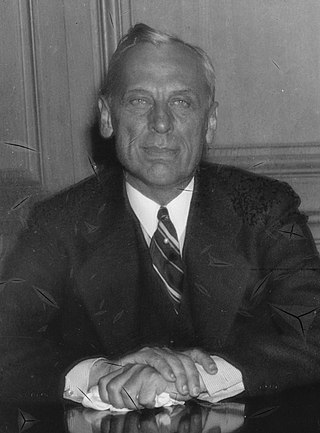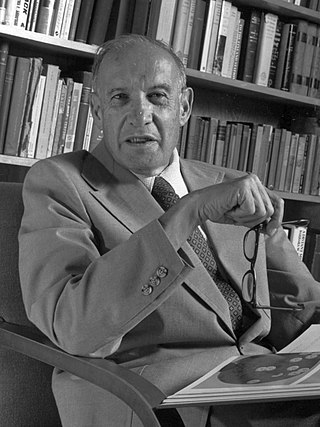Related Research Articles
Management is the administration of organizations, whether they are a business, a nonprofit organization, or a government body through business administration, nonprofit management, or the political science sub-field of public administration respectively. It is the process of managing the resources of businesses, governments, and other organizations.

A nonprofit organization (NPO), also known as a nonbusiness entity or nonprofit institution, and casually referred to simply as a nonprofit, is a legal entity organized and operated for a collective, public or social benefit, as opposed to an entity that operates as a business aiming to generate a profit for its owners. A nonprofit is subject to the non-distribution constraint: any revenues that exceed expenses must be committed to the organization's purpose, not taken by private parties. A host of organisations are nonprofit, including some political organisations, schools, business associations, churches, social clubs, and consumer cooperatives. Nonprofit entities may seek approval from governments to be tax-exempt, and some may also qualify to receive tax-deductible contributions, but an entity may incorporate as a nonprofit entity without having tax-exempt status.

Alfred Pritchard Sloan Jr. was an American business executive in the automotive industry. He was a long-time president, chairman and CEO of General Motors Corporation. Sloan, first as a senior executive and later as the head of the organization, helped GM grow from the 1920s through the 1950s, decades when concepts such as the annual model change, brand architecture, industrial engineering, automotive design (styling), and planned obsolescence transformed the industry, and when the industry changed lifestyles and the built environment in America and throughout the world.
Succession planning is a process and strategy for replacement planning or passing on leadership roles. It is used to identify and develop new, potential leaders who can move into leadership roles when they become vacant. Succession planning in dictatorships, monarchies, politics, and international relations is used to ensure continuity and prevention of power struggle. Within monarchies succession is settled by the order of succession. In business, succession planning entails developing internal people with managing or leadership potential to fill key hierarchical positions in the company. It is a process of identifying critical roles in a company and the core skills associated with those roles, and then identifying possible internal candidates to assume those roles when they become vacant. Succession planning also applies to small and family businesses where it is the process used to transition the ownership and management of a business to the next generation.

In sales, commerce, and economics, a customer is the recipient of a good, service, product, or an idea, obtained from a seller, vendor, or supplier via a financial transaction or an exchange for money or some other valuable consideration.
In the field of management, strategic management involves the formulation and implementation of the major goals and initiatives taken by an organization's managers on behalf of stakeholders, based on consideration of resources and an assessment of the internal and external environments in which the organization operates. Strategic management provides overall direction to an enterprise and involves specifying the organization's objectives, developing policies and plans to achieve those objectives, and then allocating resources to implement the plans. Academics and practicing managers have developed numerous models and frameworks to assist in strategic decision-making in the context of complex environments and competitive dynamics. Strategic management is not static in nature; the models can include a feedback loop to monitor execution and to inform the next round of planning.

Peter Ferdinand Drucker was an Austrian American management consultant, educator, and author, whose writings contributed to the philosophical and practical foundations of modern management theory. He was also a leader in the development of management education, and invented the concepts known as management by objectives and self-control, and he has been described as "the champion of management as a serious discipline".
Management by objectives (MBO), also known as management by planning (MBP), was first popularized by Peter Drucker in his 1954 book The Practice of Management. Management by objectives is the process of defining specific objectives within an organization that management can convey to organization members, then deciding how to achieve each objective in sequence. This process allows managers to take work that needs to be done one step at a time to allow for a calm, yet productive work environment. In this system of management, individual goals are synchronized with the goals of the organization.
Knowledge workers are workers whose main capital is knowledge. Examples include ICT Professionals, physicians, pharmacists, architects, engineers, scientists, design thinkers, public accountants, lawyers, editors, and academics, whose job is to "think for a living".
In relation to public services, the voluntary sector is the realm of social activity undertaken by non-governmental, not for profit organizations. This sector is also called the third sector, community sector, and nonprofit sector. "Civic sector" or "social sector" are other terms used for the sector, emphasizing its relationship to civil society. Voluntary sector activities are important in many areas of life, including social care, child care, animal welfare, sport and environmental protection.
In Search of Excellence is a book written by Tom Peters and Robert H. Waterman Jr. First published in 1982, it sold three million copies in its first four years, and was the most widely held monograph in the United States from 1989 to 2006. The book explores the art and science of management used by several companies in the 1980s.

Philip Kotler is an American marketing author, consultant, and professor emeritus; the S. C. Johnson & Son Distinguished Professor of International Marketing at the Kellogg School of Management at Northwestern University (1962–2018). He is known for popularizing the definition of marketing mix. He is the author of over 80 books, including Marketing Management, Principles of Marketing, Kotler on Marketing, Marketing Insights from A to Z, Marketing 4.0, Marketing Places, Marketing of Nations, Chaotics, Market Your Way to Growth, Winning Global Markets, Strategic Marketing for Health Care Organizations, Social Marketing, Social Media Marketing, My Adventures in Marketing, Up and Out of Poverty, and Winning at Innovation. Kotler describes strategic marketing as serving as "the link between society's needs and its pattern of industrial response."

Charles Brian Handy CBE is an Irish author/philosopher specialising in organisational behaviour and management. Among the ideas he has advanced are the "portfolio career" and the "shamrock organization".

Jeffrey Sonnenfeld is the Lester Crown Professor in the Practice of Management at Yale School of Management, and Senior Associate Dean for Leadership Studies. Sonnenfeld is best known as the founder and CEO of Chief Executive Leadership Institute (CELI), affiliated with Yale University.

William W. George is an American businessman and academic. He is a professor of management practice, and a Henry B. Arthur Fellow of Ethics at Harvard Business School. He previously served as chairman and chief executive officer of Medtronic.
A business fable is a motivational fable, parable or other fictional story that shares a lesson or lessons that are intended to be applied in the business world with the aim to improve leadership skills, personal skills, or the organizational culture. Business fables are intended to show readers how different leadership, project management, and other tools can be used in real life situations. The genre saw a peak in the early 2000s.
Frances Hesselbein was an American businesswoman and writer. She served as the CEO of the Girl Scouts of the USA, from 1976 to 1990, and the president and CEO of the Frances Hesselbein Leadership Forum, at the University of Pittsburgh Graduate School of Public and International Affairs (GSPIA), Johnson Institute for Responsible Leadership.
Jean Lipman-Blumen is the Thornton F. Bradshaw Professor of Public Policy and Professor of Organizational Behavior at Claremont Graduate University in Claremont, California. She is an expert on leadership, achieving styles, crisis management, "hot groups" organizational behavior, gender roles, and toxic leadership. Lipman-Blumen is director and co-founder, with Prof. Richard Ellsworth, of CGU's Institute for Advanced Studies in Leadership. She is president and co-founder, with Harold J. Leavitt, the Kilpatrick Professor of Organizational Behavior, at Stanford Graduate School of Business, of the Connective Leadership Institute, a leadership development, research, and management consulting firm, in Pasadena, California.
Winfried W. Weber is a German economist and management professor. He is director of the Mannheim Institute of Applied Management Research at Mannheim University of Applied Sciences, with a research focus on new role models of management, global family business and entrepreneurship.
Peter Economy is an American author, editor, and ghostwriter. Although his most-recent books tend to reside in the technology genre—particularly software product development and AWS/cloud—he has written books in a variety of other genres, including leadership, management, memoir, biography, consulting, how-to, entrepreneurship, marketing, sales, and a children’s book. Economy is The Leadership Guy on Inc.com where he has published more than 1,500 articles on a variety of topics related to leadership, management, and other business topics.
References
- ↑ Wartzman, Rick. "AIG, and Drucker's Glimpse at a Very Dark Place." Archived April 15, 2011, at the Wayback Machine Business Week, March 20, 2009.
- ↑ Carpenter, Dave. Giving and getting -- more Baby Boomers look to volunteerism. Associated Press. March 27, 2001. Reprinted in Times Daily on April 1, 2001. Reprinted as Baby Boomer business booms.. via volunteers. in The Daily Courier. April 1, 2001.
- ↑ "Peter Drucker and Me". Forbes .
- ↑ "Ed Stetzer on ChurchLeaders.com". ChurchLeaders. June 28, 2021. Retrieved June 3, 2024.
- ↑ "Drucker and Me: Modeling Mentorship for the Modern Church < Books | CBN.com". www.cbn.com. Retrieved June 3, 2024.
- ↑ CMA merged with Christian Stewardship Association in April 2008 to become Christian Leadership Alliance.[ citation needed ]
- ↑ "One of Christianity's Most Influential Figures Follows in the Footsteps of Mentor, Peter Drucker" (Press release). Mosaic Trust. April 21, 2005. Retrieved May 15, 2009.
- ↑ "Remembering Bob Buford, the Christian Leader's Leader". News & Reporting. Retrieved April 19, 2018.